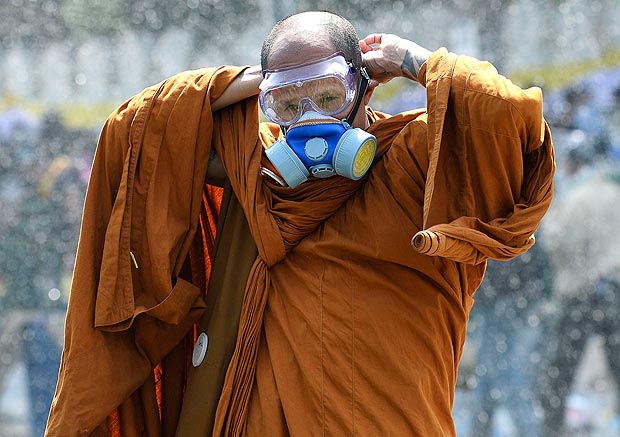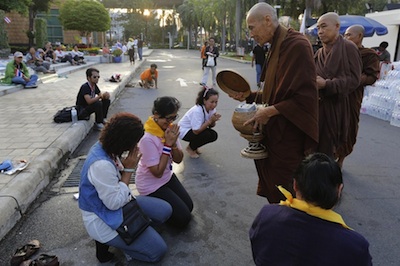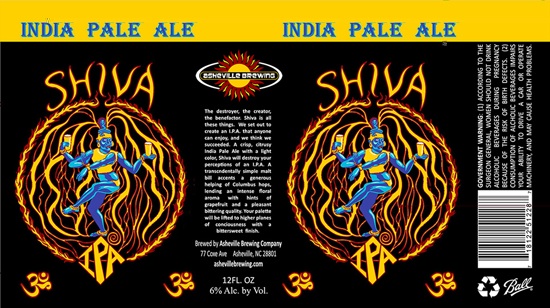
Thai Monks Participate in Anti-Government Protests
Over the past month, protesters have held mass demonstrations outside ministry buildings in Thailand, a country home to 63 million Buddhists. Ralliers voiced opposition to an amnesty bill that, if passed, would pardon exiled former Prime Minister Thaksin Shinawatra of corruption charges. Interestingly enough, the Senate has already rejected the proposed bill, but the gesture has done little to tamp down activists’ frustration with government corruption and nepotism. Regularly clashing with riot police, protesters have demanded that Yingluck, sister of Thaksin and the current prime minister, resign and dissolve the House of Representatives, which “Yellow Shirt” anti-government protesters refer to as the “Thaksin Regime.” However, a counter-protest has risen up at a nearby stadium, where approximately 40,000 of Thaksin’s supporters—or “Red Shirts”—have sought to rejuvenate the amnesty bill. At least one anti-government protester was shot dead in an altercation with Thaksin supporters.
In keeping with the nation’s widespread reverence for the monarchy, protesters and government officials struck a truce in order to celebrate the 86th birthday of King Bhumibol Adulyadej on Thursday. During that time, anti-government protestors stood down—uncharacteristically—in order to venerate a longstanding authoritarian institution. Such contradictions speak to the political complexity of Thailand, where portraits of the King appear on highway billboards and temple shrines alike.

Buddhist monks have played a significant role in the protests. Luang Pu Buddha Isara, abbot of Wat Or Noie in Nakhon Pathom’s Kamphaeng Saen district, has appeared frequently in Thai media as an outspoken critic of the government. Recently, he even promised to assume leadership of the protests in the event that Thai police followed through on their arrest warrant for current head Suthep Thaugsuban. In a tweet from December 1, Buddha Isara called his countrymen to action: “When politicians lose their sense of shame in wrongdoing, people suffer. Need more people to stimulate Thai Prime Minister’s sense of shame.”
Journalists have taken notice of monks among the rank-and-file at protests. Additionally, they have provided ritual blessings for protesters, as pictured in the photo above.

Buddhist Minister Decries “Shiva I.P.A”
Only a few moons ago, President Obama called a beer summit to defuse the scandal surrounding the police profiling of Harvard professor Henry Louis Gates. Long past, though, are the days when beer meant reconciliation and racial harmony. Now beer lies at the center of an interfaith feud: responding to a beer entitled “Shiva I.P.A.,” religious leaders of all stripes threw their support behind the Universal Society of Hinduism in its condemnation of the product this week.
Rajan Zed, President of the Universal Society of Hinduism, has demanded that the North Carolina–based Asheville Brewing Company apologize and change the title of the beer. Zed’s interfaith supporters include a Greek Orthodox clergyman and a Jewish Rabbi—both from Nevada. Joining the fray, Buddhist minister Jikai’ Phil Bryan wrote a note to Zed saying, “I agree completely with your objection to the use of Lord Shiva as the name of a beer. It will be to the great credit of the brewing company to honor your request and change the name of the beer. I trust they will hear your message and respond sensitively to it.”
The beer’s label depicts a neon blue muscled Lord Shiva holding two glasses of golden-hued lager. Described as a “transcendentally simple malt bill” that will “destroy all your preconceptions of an I.P.A,” the beer is promised, in a final stroke of marketing gall, to lift your palette “to a higher plane of consciousness.”
The peddling of Eastern religious words and symbols is nothing new. Might the Universal Society of Hinduism just be crying over (already) spilt beer? I can’t walk two blocks in Brooklyn without stumbling upon a storefront display of Zen Green Tea or chocolates shaped like the Buddha. But that’s what makes this outrage so intriguing: an interfaith coalition has said enough is enough.
But their backlash should avoid indiscriminately targeting any mix of sacred and profane. Hell, when the secular novelist Thomas Pynchon does it with a wink, it’s called high art. Who are we to scoff at a depiction of God on a beer bottle? On the contrary, what’s bothersome is the crass commercial motivation behind the design. Shallow cultural appropriation for the sake of profits is an ugly business, and I applaud any religious leader who steps up and says so.
—Max Zahn, Editorial Intern